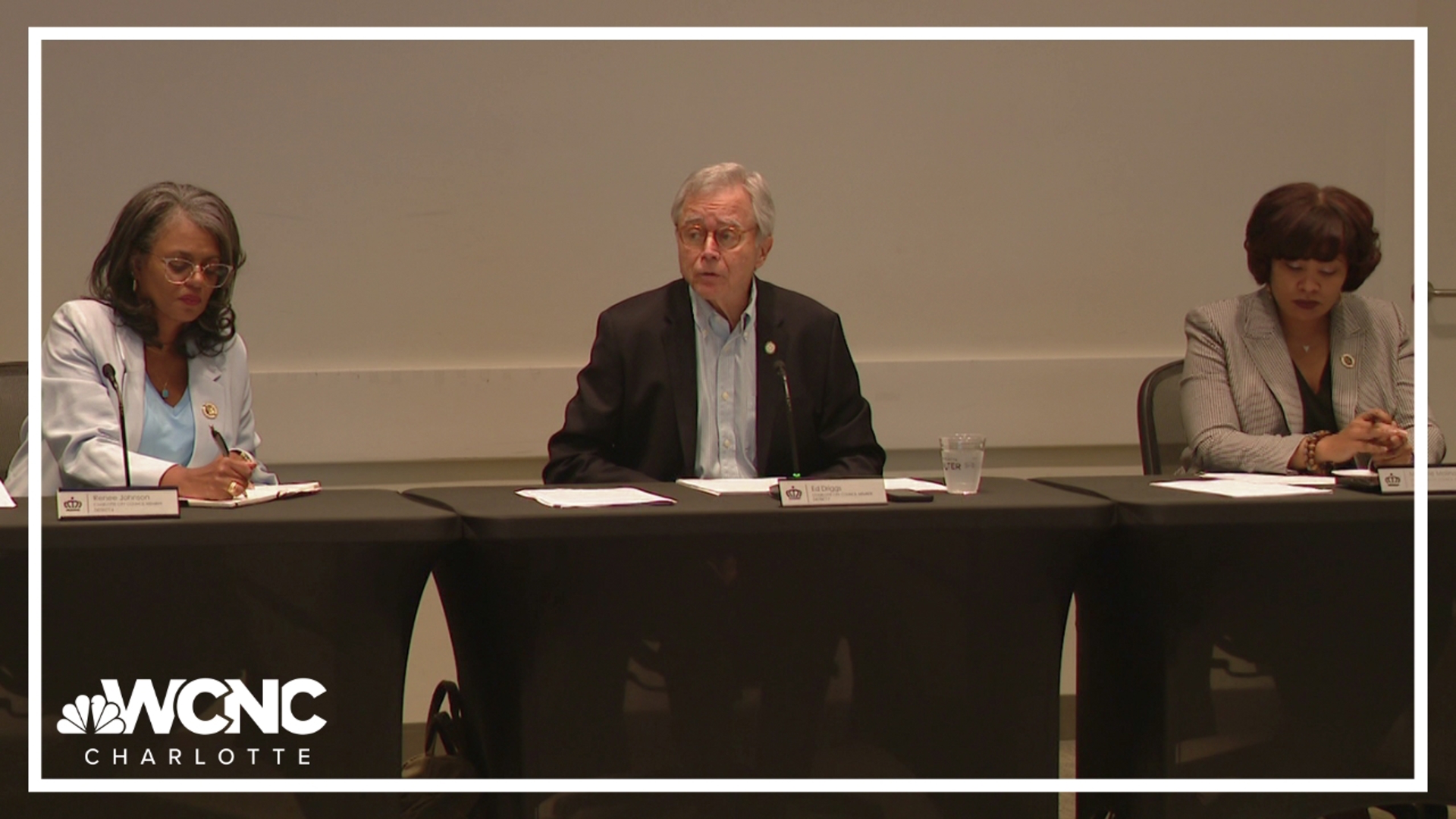CHARLOTTE, N.C. — Charlotte leaders held a special meeting Tuesday afternoon about the proposed one-cent sales tax to pay for transit and road projects and gave an update on purchasing the tracks needed for the Red Line commuter train to Lake Norman.
Charlotte City Council's transportation committee discussed draft legislation language enabling a countywide 1% sales tax to fund these projects and create a regional transit authority to oversee the spending. The meeting comes a day after Matthews leaders rejected the sales tax proposal, voicing frustration over long-discussed plans to extend light rail service to the town were changed to a rapid bus transit line along U.S. 74.
"East Charlotte and Matthews are being asked to settle for an untested Bus Rapid Transit (BRT) system instead of rail service promised to other areas," Town Commissioner Ken McCool said. "This unequal distribution isn't fair and undermines the idea of a unified regional solution."
Last week, governments from five of six towns in Mecklenburg County — Cornelius, Davidson, Huntersville, Mint Hill and Pineville — joined Charlotte and Mecklenburg County in endorsing the plan. Matthews was the notable exception.
“It’s like South End here in Charlotte," Matthews Mayor John Higdon said. "Lots of action, very vibrant. You don’t get that from a bus station. We’d be missing out on decades of tax growth, tax revenue if we just went with buses.”
These frustrations came up at the meeting, with some council members concerned about a lack of transparency and time.
"We've been talking about this Silver Line and an authority for 30 years, and the council has 30 minutes on the agenda to discuss it and then 30 days to vote," Council Member Renee Johnson told WCNC Charlotte.
The Council's next steps include a closed session on Aug. 19, as well as an action review presentation on Aug. 26. If all goes as planned, they will adopt a resolution supporting the sales tax legislation on Sept. 3.
City Councilman Ed Driggs, head of the city's transportation committee, says he's open to hearing conversations and ideas about the Silver Line. However, those discussions might be hampered by looming deadlines.
"If we did decide not to proceed with this draft legislation in favor of a different process, I believe it will take us years to get back to this point, if ever," Driggs said. "I think we have an opportunity now that may not come again that soon."
In addition to the Silver Line plan, Tuesday's meeting also included discussions about Charlotte's effort to purchase tracks and land from Norfolk Southern for the Red Line, the 25-mile train that would connect Uptown to Mooresville. Initially approved in 1998, the Red Line has been more than 20 years in the making, leaving people frustrated about the lack of progress. That all changed when Norfolk Southern finally said it would consider selling the tracks.
Those tracks, known as the O-Line, are currently part of Norfolk Southern's freight network. As part of the proposed deal, Norfolk Southern would continue to operate freight trains on the tracks. The project calls for 10 park-and-ride stations along the 25-mile route.
Driggs told WCNC Charlotte he's optimistic the Red Line deal will be finalized soon. City Manager Marcus Jones pushed leaders to get a lot done before the Sept. 9 closing date.
Each town and city in support of the one-cent sales tax is being asked to pass resolutions publicly supporting the plan. Assuming it passes, the proposal will then head to the General Assembly. If state lawmakers don't approve the deal, the sales tax referendum cannot be put on the ballot in 2025.
"We will need to explain [to voters] all of the benefits, how traffic will be eased, how the air quality will improve, how economic development will benefit," Driggs said.
In an email to city leaders, Jones said that 60% of the money raised by the sales tax would go toward transit, with 40% for rail and 20% for buses. The other 40% would go toward roads. Local leaders hope that will be enough to appease state lawmakers, including House Speaker Tim Moore.
"I liked the fact that it's a regional approach," Moore told WCNC Charlotte in June. "I think that's important, but I do believe there needs to be a true emphasis on roads."
Moore being open to the transit deal is a big step after state leaders previously said they'd only be open to a "roads-first" plan.
Flashpoint is a weekly in-depth look at politics in Charlotte, North Carolina, South Carolina, and how it impacts everyone with host Ben Thompson. Listen to the podcast weekly.
SUBSCRIBE: Apple Podcasts || Spotify || Pandora || Google Podcasts || iHeart
All of WCNC Charlotte's podcasts are free and available for both streaming and download. You can listen now on Android, iPhone, Amazon, and other internet-connected devices. Join us from North Carolina, South Carolina, or on the go anywhere.

